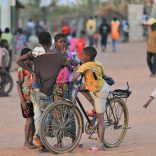Mozambique: Pedro, seeking the family of the boy he fled with
AIDS staff must do more field work, says Health minister

Mozambican Health Minister Nazira Abdula on Friday demanded that the coordinators of the National AIDS Council (CNCS) should leave their offices and do more field work, thus contributing to eradicating the HIV/AIDS epidemic in Mozambique.
Speaking in Maputo at the opening session of a meeting of the CNCS Consultative Council, Abdula said the CNCS staff should work more with civil society organisations to make them more robust, since this would be a more effective way of halting the spread of the epidemic.
Abdula, who is deputy chairperson of the CNCS, wanted to see the National Council behave in a more pro-active way. “Get out of your offices and work with society on encouraging activities that focus on preventing HIV, retaining HIV-positive people in care and treatment, and eliminating any attitudes of stigma and discrimination”, she said.
She stressed it is imperative that the CNCS know the real situation of the epidemic in each province, and demanded a quarterly presentation of information on the epidemic.
The CNCS Executive Secretary, Francisco Mbofana, said the Minister’s demand was legitimate. He believed that sending the CNCS staff into the field would help identify on the ground the challenges faced by the various organisations involved in the fight against HIV/AIDS, and seek appropriate solutions.
“We are a coordinating body”, he said. “We cannot always sit waiting for people to come to us. We need to know what the various players are doing. We need to go and monitor them. We need to leave our offices and go to speak with those forces, such as households and civil society bodies, who can contribute to a stronger response to the disease”.
He said some progress had been made in the fight against the epidemic. These positive results included the expansion of the anti-retroviral treatment that prolongs the lives of HIV positive people, and the prevention of “vertical transmission” (the transmission of the virus from an HIV-positive pregnant woman to her unborn child).
Mbofana was also encouraged by “the expansion of preventive activities in the biomedical area, such as male circumcision and voluntary counselling and testing”.
“More health units provide services to prevent vertical transmission”, he said. “This is an enormous advance. But we need to improve. We have challenges of retaining these patients in the treatment. We are identifying the best ways of meeting these challenges”.
The work undertaken is producing results, added Mbofana, because a larger number of citizens are now aware of their HIV status and have access to treatment.
Data presented at the opening session indicate that over 1.2 million Mozambicans are now on anti-retroviral treatment, which is more than half the 2.1 million people estimated to be HIV-positive .
According to the CNCS, 130,000 new HIV infections were reported in 2017, a decline on the 136,000 reported in 2016, and the 150,000 new cases of 2014.













Leave a Reply
Be the First to Comment!
You must be logged in to post a comment.
You must be logged in to post a comment.